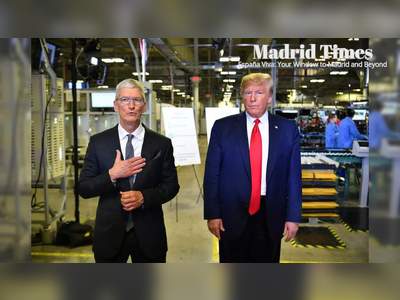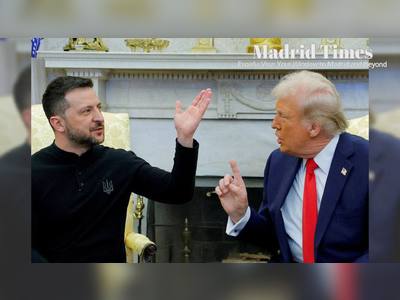Sánchez Addresses Economic Concerns Amidst US Tariffs
Spanish Prime Minister emphasizes political unity while criticizing opposition for perceived contradictions.
Pedro Sánchez, the Prime Minister of Spain, has sought to mitigate concerns about a potential recession in the country stemming from tariffs imposed by U.S. President Donald Trump.
During an informal conversation with journalists on his official trip to Vietnam and China, Sánchez emphasized the need for political unity in response to the implications of these tariffs, while criticizing the Partido Popular (PP) for what he views as contradictory positions.
Analyzing the repercussions of Trump’s tariff decisions, Sánchez noted that the global economic environment is currently experiencing significant strain, particularly in the U.S. He urged the Trump administration to reconsider its stance and return to the negotiating table.
While he acknowledged the unpredictable nature of economic developments, he deemed it premature to declare a recession and expressed confidence that Spain would remain resilient due to robust economic growth and optimistic projections.
Sánchez highlighted his government's proven track record in crisis management, asserting that Spain possesses a strong capacity for response, a capability that was demonstrated in the recent unveiling of a contingency plan to address the impact of the tariffs.
He called for unity among political parties due to the national, regional, and sectoral effects of the tariffs, pointing out the inconsistencies in the PP's approach, particularly their negotiations with far-right Vox in regional contexts while distinguishing themselves on the national level.
On the topic of further dialogue, Sánchez indicated that he does not anticipate a direct meeting with PP leader Alberto Núñez Feijóo, referring to ongoing discussions with parliamentary groups instead.
He remarked that some of the proposals presented by Feijóo appear repetitive and are not aligned with the present crisis.
Additionally, Sánchez expressed concerns about the visibility of the consequences stemming from the rise of ultra-right movements, which he has warned about previously, citing the associated risks for Europe and Spanish politics.
The criticisms of the PP were reiterated following a statement from the opposition, which accused the government of unilaterally excluding it from negotiations aimed at addressing the crisis.
The PP contended that the government's agreement with Junts over tariff quotas unfairly distributes resources among Spaniards.
Sánchez reaffirmed the government's commitment to pursuing new budget approvals, emphasizing that it would not shy away from its responsibilities and underscoring the capacity to respond to the current challenges posed by U.S. policy.
In his remarks regarding the European Commission’s response to the tariffs, Sánchez expressed full support, advocating for a strategy that involves engagement and collaborative measures while maintaining a calm approach.
As for the significance of his trip to China and Vietnam, Sánchez underscored the importance of strengthening these markets, especially at this critical juncture, and reducing the existing trade imbalance.
He posited that Europe must reassess its relationships with China and vice versa, positioning Spain as a potential builder of more balanced alliances.
In this context, Sánchez found the prospect of Chinese investments in Europe particularly intriguing, especially in key sectors where Spain excels, such as energy transformation, automotive industries, gigafactories, and green hydrogen projects.
During an informal conversation with journalists on his official trip to Vietnam and China, Sánchez emphasized the need for political unity in response to the implications of these tariffs, while criticizing the Partido Popular (PP) for what he views as contradictory positions.
Analyzing the repercussions of Trump’s tariff decisions, Sánchez noted that the global economic environment is currently experiencing significant strain, particularly in the U.S. He urged the Trump administration to reconsider its stance and return to the negotiating table.
While he acknowledged the unpredictable nature of economic developments, he deemed it premature to declare a recession and expressed confidence that Spain would remain resilient due to robust economic growth and optimistic projections.
Sánchez highlighted his government's proven track record in crisis management, asserting that Spain possesses a strong capacity for response, a capability that was demonstrated in the recent unveiling of a contingency plan to address the impact of the tariffs.
He called for unity among political parties due to the national, regional, and sectoral effects of the tariffs, pointing out the inconsistencies in the PP's approach, particularly their negotiations with far-right Vox in regional contexts while distinguishing themselves on the national level.
On the topic of further dialogue, Sánchez indicated that he does not anticipate a direct meeting with PP leader Alberto Núñez Feijóo, referring to ongoing discussions with parliamentary groups instead.
He remarked that some of the proposals presented by Feijóo appear repetitive and are not aligned with the present crisis.
Additionally, Sánchez expressed concerns about the visibility of the consequences stemming from the rise of ultra-right movements, which he has warned about previously, citing the associated risks for Europe and Spanish politics.
The criticisms of the PP were reiterated following a statement from the opposition, which accused the government of unilaterally excluding it from negotiations aimed at addressing the crisis.
The PP contended that the government's agreement with Junts over tariff quotas unfairly distributes resources among Spaniards.
Sánchez reaffirmed the government's commitment to pursuing new budget approvals, emphasizing that it would not shy away from its responsibilities and underscoring the capacity to respond to the current challenges posed by U.S. policy.
In his remarks regarding the European Commission’s response to the tariffs, Sánchez expressed full support, advocating for a strategy that involves engagement and collaborative measures while maintaining a calm approach.
As for the significance of his trip to China and Vietnam, Sánchez underscored the importance of strengthening these markets, especially at this critical juncture, and reducing the existing trade imbalance.
He posited that Europe must reassess its relationships with China and vice versa, positioning Spain as a potential builder of more balanced alliances.
In this context, Sánchez found the prospect of Chinese investments in Europe particularly intriguing, especially in key sectors where Spain excels, such as energy transformation, automotive industries, gigafactories, and green hydrogen projects.
Translation:
Translated by AI
AI Disclaimer: An advanced artificial intelligence (AI) system generated the content of this page on its own. This innovative technology conducts extensive research from a variety of reliable sources, performs rigorous fact-checking and verification, cleans up and balances biased or manipulated content, and presents a minimal factual summary that is just enough yet essential for you to function as an informed and educated citizen. Please keep in mind, however, that this system is an evolving technology, and as a result, the article may contain accidental inaccuracies or errors. We urge you to help us improve our site by reporting any inaccuracies you find using the "Contact Us" link at the bottom of this page. Your helpful feedback helps us improve our system and deliver more precise content. When you find an article of interest here, please look for the full and extensive coverage of this topic in traditional news sources, as they are written by professional journalists that we try to support, not replace. We appreciate your understanding and assistance.











